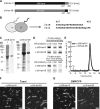The structured core of human β tubulin confers isotype-specific polymerization properties
- PMID: 27185835
- PMCID: PMC4878094
- DOI: 10.1083/jcb.201603050
The structured core of human β tubulin confers isotype-specific polymerization properties
Abstract
Diversity in cytoskeleton organization and function may be achieved through variations in primary sequence of tubulin isotypes. Recently, isotype functional diversity has been linked to a "tubulin code" in which the C-terminal tail, a region of substantial sequence divergence between isotypes, specifies interactions with microtubule-associated proteins. However, it is not known whether residue changes in this region alter microtubule dynamic instability. Here, we examine recombinant tubulin with human β isotype IIB and characterize polymerization dynamics. Microtubules with βIIB have catastrophe frequencies approximately threefold lower than those with isotype βIII, a suppression similar to that achieved by regulatory proteins. Further, we generate chimeric β tubulins with native tail sequences swapped between isotypes. These chimeras have catastrophe frequencies similar to that of the corresponding full-length construct with the same core sequence. Together, our data indicate that residue changes within the conserved β tubulin core are largely responsible for the observed isotype-specific changes in dynamic instability parameters and tune tubulin's polymerization properties across a wide range.
© 2016 Pamula et al.
Figures




References
-
- Banerjee A., Roach M.C., Wall K.A., Lopata M.A., Cleveland D.W., and Ludueña R.F.. 1988. A monoclonal antibody against the type II isotype of beta-tubulin. Preparation of isotypically altered tubulin. J. Biol. Chem. 263:3029–3034. - PubMed
-
- Banerjee A., Roach M.C., Trcka P., and Ludueña R.F.. 1992. Preparation of a monoclonal antibody specific for the class IV isotype of beta-tubulin. Purification and assembly of alpha beta II, alpha beta III, and alpha beta IV tubulin dimers from bovine brain. J. Biol. Chem. 267:5625–5630. - PubMed
Publication types
MeSH terms
Substances
Associated data
- Actions
- Actions
Grants and funding
LinkOut - more resources
Full Text Sources
Other Literature Sources

